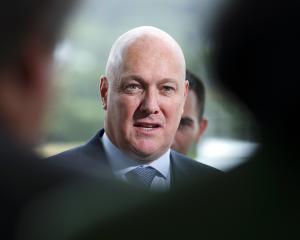Many people will be familiar with the Rotary motto ''Service above self'', a philosophy which is the cornerstone of many organisations and individuals working in New Zealand and around the world for the betterment of others.
The work of such people has undoubtedly made a difference to people from all walks of life in areas of the world facing challenges and in humanitarian crises, in times of famine, conflict, health epidemics, in the wake of natural disasters, or in places where all forms of poverty make everyday survival tough.
And there are many New Zealanders who are on the receiving end of help, too, whether through charitable organisations and individuals providing school breakfasts to youngsters, meals on wheels to the elderly, or the raft of support services in-between.
The benefits of such humanitarian, support and volunteer work are obvious in terms of the recipients.
But the benefits to those giving of their time, energy and money to help others are also appreciable and can often be life-changing themselves. Through service, the self can prosper, too.
Many people feel the desire to help others less fortunate than themselves, some to pay back generosity given to them, others to spread their wealth or good fortune.
Many people working in the field of mental health advocate some form of volunteer work to those suffering from depression, because of the immense benefits focusing on others can bring.
Many schools and youth programmes have some sort of voluntary service component to encourage outward thinking.
Never have such values seemed so important as in today's society where instant gratification rules, success is measured in the here and now, often by wealth and material possessions, and the all-powerful consumerism messages are bigger, better, faster, more.
The focus on self can set up a vicious cycle of expectations which are often impossible to meet personally, make relationships difficult, and are at odds with creating a productive, harmonious, stable society with a future.
In this context it was pleasing to hear the advice given to University of Otago medical, physiotherapy and other graduands at their graduation ceremony at the weekend.
Otago School of Physiotherapy dean Prof David Baxter iterated the fundamental importance of taking the time, and ''allowing'' oneself, to find happiness in life.
He stressed that achieving real and lasting happiness and leading ''deeply fulfilled lives'' would come not by striving for materialistic success, but through caring for, and learning from, patients.
He suggested people dealing with illness and disability have much to teach those willing and able to listen about real heroism and strength.
Orthodontist and mountaineer Dr Julian Haszard similarly urged graduates to give back something, saying by so doing they would also gain ''balance and perspective'' in their lives.
Young medical practitioners such as those in the audience certainly have the scope to achieve much in the world for others and for themselves.
It seemed fitting that, on the same day as the graduation article, this newspaper carried a brief report about the 80 New Zealanders, predominantly healthcare professionals, who have registered to join the international fight against Ebola in Sierra Leone from early next year.
The worst outbreak of the haemorrhagic fever on record has now killed more than 6070 people from 17,145 cases, according to the World Health Organisation.
The deadly disease is highly contagious in its later stages, and many African and several international healthcare workers, have died in their efforts to offer comfort and medical care to those living and dying in what must be terrifying circumstances.
There can surely be few more extreme examples of ''service above self''.
But the messages given to medical graduands, and the examples set by volunteers working in hotspots around the world, can be emulated by all of us in myriad ways, with worthwhile contributions made on any scale.
From providing company and conversation to an elderly isolated person, or helping tend their garden, to becoming a buddy to a child or coaching a sports team, to sharing building skills and the like on overseas projects.
By helping others we help ourselves, and the rewards last a lifetime.












